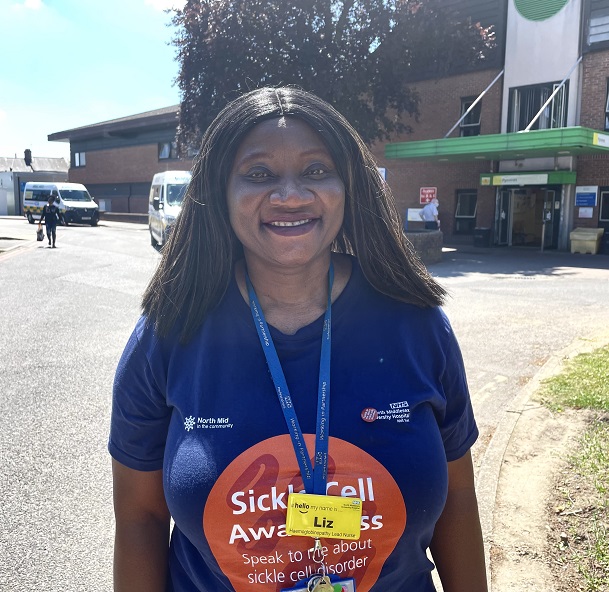Hello, my name is Liz Odeh

Liz Odeh joined North Mid in 2016 as a sickle cell and thalassaemia lead nurse.
Working across the hospital’s A&E department as well as on the wards, Liz has been integral to the work and care North Mid provides to treat patients who live with these conditions. From attending to patients to assessing them, undergoing a physical examination, detecting the problem, requesting investigation and then treating the patient – Liz ensures she is involved in every part of the patients’ care.
Having worked at North Mid for over five years, Liz has consistently built strong relationships with her patients and implemented a number of processes and changes across the hospital to ensure patients receive the appropriate care.
Supporting those in crisis
One of the many things implemented by Liz is the Hydroxycarbamide Nurse-Led clinic which offers patients with sickle cell disorder who suffer with a frequent painful crisis a chemotherapy drug. The drug given to patients helps to reduce frequent painful sickle cell crisis, the number of hospital admissions, acute chest syndrome (chest crises) as well as the need for blood transfusions. In addition to this, the drug aims to increase life expectancy and improve quality of life.
Prior to the new clinic, many patients were assigned to the main clinic which ran on Tuesday’s and was run by Liz, two consultants and a registrar for blood test monitoring due to the side-effects of hydroxycarbamide drug. However, Liz recognised the need to have this separate hydroxycarbamide nurse-led clinic for these patients; this not only increased capacity in the main Tuesday’s clinic but also provided a more targeted service. Patients who are seen in the nurse-led clinic are now only seen in the main Tuesday’s clinic at least once or twice a year instead of every 2 to 3 months.
The red cell exchange service
Liz also implemented the automated red cell exchange service. Automated red blood cell exchange is a treatment using an apheresis machine which removes a patient’s red cells and replaces them with donor red cells. Using this machine decreases the amount of sickle cell haemoglobin in the blood. There are a number of benefits to using the automated red blood exchange. These include prevention or improvement of symptoms of painful crises; treat as well as prevent future complications and short procedure time compared to manual exchange. The machine also fast tracks patients’ recovery, reduces inpatients’ length of stay and reduces iron overload. An overload of iron in patients with sickle cell Disease can lead to liver damage, heart and endocrine system problems.
With sickle cell disorder needing specialist care and treatment and with timing being crucial to those who live with the condition, Liz as well as other specialist consultants regularly visit wards across hospital as well as the A&E department to educate staff about the disease and the need to act quickly. She has also led on creating patient newsletters as well as generating a dedicated website page to raise awareness amongst patients and the wide community.
The Trust is committed to consistently improve its services for the local population, particularly those who live with sickle cell disorder. Over the past couple of years, North Mid has implemented a new specialist area on a ward for patients with sickle cell disorder who are admitted into hospital. Nurses on the specialist ward have gone through vigorous training to ensure they are fully equipped and skilled to treat patients should they have a crisis. Having implemented this, the ward and hospital has received excellent feedback from patients.
